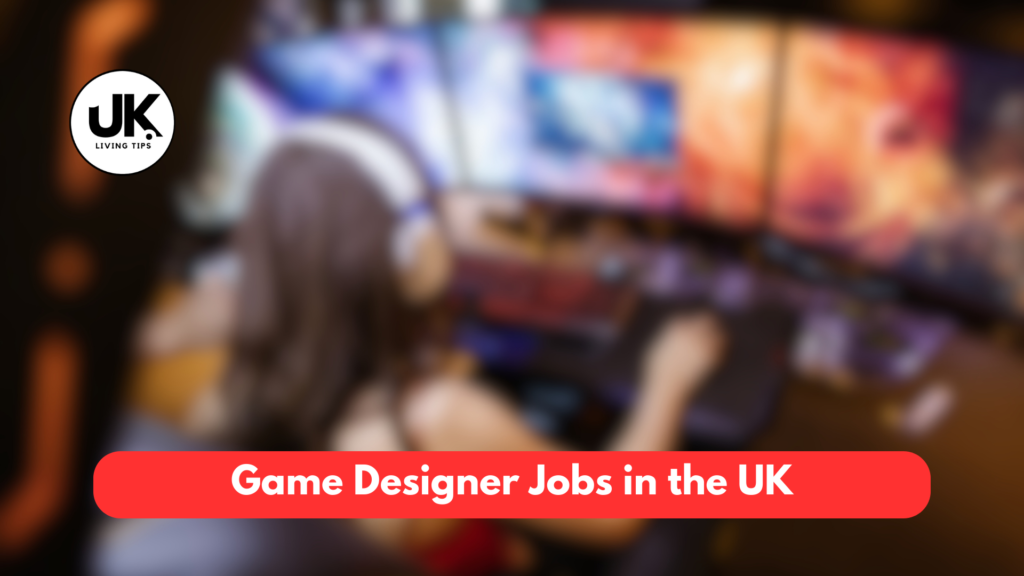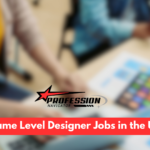What is a Game Designer?
Game Designer Jobs in the UK: A game designer is someone who dreams up the ideas behind video games. They create the rules, characters, levels, and storylines that make games exciting and engaging. Think of them as the architects of a virtual world. Their job is to design a fun game while also making sure it’s technically possible to create.
READ ALSO: Game-level Designer jobs
In the UK, game designers work in various settings, from small indie studios to large, well-known companies like EA, Rockstar, and Codemasters. The UK gaming industry is one of the largest in the world, making it an excellent place to start a career in game design.
Table of Contents
Education and Training
Relevant Degrees for Game Designer Jobs in the UK
To become a game designer in the UK, most people start with a degree in a related field. Here are some popular options:
- Game Design: A specialized degree focused entirely on game creation.
- Computer Science: Offers a strong foundation in programming, which is essential for game development.
- Art and Design: Great for those who want to focus on the visual aspects of games.
Top Universities in the UK for Game Design
Several universities in the UK are renowned for their game design programs:
- University of Abertay: Known as a pioneer in game design education.
- Staffordshire University: Offers a wide range of courses in game development.
- University of Hertfordshire: Provides comprehensive courses in game art and design.
Certifications and Alternative Education
If you don’t want to commit to a full degree, there are other ways to learn game design:
- Online Courses: Platforms like Coursera, Udemy, and edX offer courses in game design and development.
- Bootcamps: Intensive, short-term programs that focus on specific skills like programming or game art.
- Certifications: Look for certifications in game design software like Unity or Unreal Engine, which are highly valued by employers.
Skills You Need
Technical Skills
- Programming: Knowledge of languages like C++, C#, and Python is essential.
- Software Proficiency: Familiarity with game engines like Unity or Unreal Engine.
- Level Design: Understanding how to create engaging and balanced game levels.
Creative Skills
- Storytelling: The ability to craft compelling narratives that engage players.
- Art and Animation: Skills in drawing, 3D modeling, and animation can be a big plus.
- Problem-Solving: Quickly figuring out how to overcome technical and creative challenges.
Soft Skills
- Communication: You’ll need to work closely with artists, programmers, and other team members.
- Teamwork: Collaboration is key in game development.
- Time Management: Balancing creativity with deadlines is crucial.
Finding Game Designer Jobs in the UK
Job Portals and Websites
Here are some great places to start your job search:
- Indeed: A general job search site with many game design listings.
- GamesIndustry.biz: Focused on jobs in the gaming industry.
- LinkedIn: Useful for networking and finding job openings.
Networking Opportunities
Attending industry events and conventions can help you make valuable connections:
- EGX (Eurogamer Expo): The UK’s biggest gaming event.
- Develop Brighton: A conference for game developers with networking opportunities.
- Game Developers Conference (GDC): Although based in the US, many UK designers attend.
Building a Portfolio
Your portfolio is your calling card in the game design industry. Here’s how to make it stand out:
- Diverse Projects: Include a variety of game types, from mobile games to full-scale PC or console games.
- Playable Demos: Let potential employers experience your work firsthand.
- Document Your Process: Show how you went from concept to finished product.
The Interview Process
When you land an interview, here’s what to expect:
- Common Questions: Be prepared to talk about your favorite games, your design process, and how you handle feedback.
- Portfolio Review: You’ll likely be asked to walk through your portfolio and explain your work.
- Technical Tests: Some companies may ask you to complete a design challenge or technical test.
Salary Expectations
Average Salary
In the UK, game designers can expect the following salary ranges:
- Entry-Level: £25,000 – £30,000 per year
- Mid-Level: £36,000 – £50,000 per year
- Senior-Level: £50,000 – £70,000+ per year
Factors Affecting Salary
Several factors can influence how much you earn:
- Experience: More experience usually means a higher salary.
- Location: Salaries tend to be higher in London and other major cities.
- Company Size: Larger companies often offer better pay and benefits.
Future Scope of Game Design in the UK
The future looks bright for game designers in the UK. The gaming industry is growing rapidly, driven by advances in technology and increasing consumer demand. Here are some trends to watch:
- Virtual Reality (VR) and Augmented Reality (AR): New platforms are creating exciting opportunities for game designers.
- Mobile Gaming: The popularity of mobile games continues to rise, offering a massive market.
- Indie Games: Independent studios are thriving, and many are gaining global recognition.
Conclusion
A career in game design in the UK offers a fantastic blend of creativity, technical challenge, and the opportunity to work on projects that entertain millions. Whether you’re just starting out or looking to advance your career, there’s never been a better time to dive into the world of game design.
FAQs
What is the average salary for a game designer in the UK?
The average salary ranges from £20,000 to £70,000+ per year, depending on experience and location.
Is a degree necessary to become a game designer?
While a degree is common, it’s not strictly necessary. Many successful designers have taken alternative education paths.
What software should I learn as a game designer?
Familiarity with game engines like Unity and Unreal Engine is highly recommended.
How can I improve my chances of getting hired?
Build a strong portfolio, network within the industry, and stay updated on the latest trends.
What are the best resources for learning game design?
Online courses, boot camps, and certifications from platforms like Coursera, Udemy, and Unity’s own learning resources are great starting points.
CV sample Format for Game Designer Jobs in the UK
[Your Full Name]
[Your Address]
[City, State, Zip Code]
[Email Address]
[Phone Number]
[LinkedIn Profile] | [Portfolio Website] | [GitHub (if applicable)]
Professional Summary
Creative and passionate Game Designer with [X] years of experience in designing engaging and innovative game concepts. Proficient in [specific game design tools/software], with a strong understanding of gameplay mechanics, level design, and player experience. Known for delivering high-quality work within deadlines and collaborating effectively with cross-functional teams.
Skills
- Game Design: Gameplay mechanics, level design, storyboarding, character development
- Tools & Software: Unity, Unreal Engine, Blender, Maya, Photoshop, Illustrator, [Any other relevant tools]
- Programming: C#, Python, JavaScript, [Other languages you know]
- Prototyping: Rapid prototyping, wireframing, user testing
- Collaboration: Team leadership, project management, communication, agile methodologies
- Special Skills: VR/AR development, mobile game design, narrative design
Professional Experience
Game Designer
[Company Name] – [Location]
[Month, Year] – Present
- Led the design and development of [specific game or project], achieving [specific success metrics].
- Collaborated with artists, developers, and writers to create cohesive and immersive game worlds.
- Conducted playtesting sessions and gathered player feedback to refine game mechanics and improve user experience.
- Designed and balanced gameplay elements, including [specific features, levels, or systems].
- Managed project timelines and coordinated with the production team to ensure on-time delivery.
Junior Game Designer
[Company Name] – [Location]
[Month, Year] – [Month, Year]
- Assisted in the development of [specific game or project], contributing to [specific tasks or responsibilities].
- Created detailed design documents, wireframes, and prototypes for new game features.
- Participated in brainstorming sessions and provided creative input on game narratives and mechanics.
- Worked closely with the QA team to identify and resolve gameplay issues.
Education
Bachelor of Arts in Game Design
[University Name] – [Location]
[Month, Year] – [Month, Year]
- Relevant coursework: Game Theory, Level Design, Interactive Storytelling, 3D Modeling, [Other relevant courses]
Certifications (if applicable)
- [Certification Name], [Issuing Organization], [Year]
Projects
[Project Name] – [Brief Description]
[Link to Project or Portfolio]
- Developed [specific aspects of the game], focusing on [particular elements like level design, mechanics, or story].
- Implemented [tools/technologies] to achieve [specific outcome].
- Received [specific recognition or results, if applicable].
[Project Name] – [Brief Description]
[Link to Project or Portfolio]
- Designed [specific features or levels] that enhanced player engagement and enjoyment.
- Collaborated with [team members or departments] to ensure smooth integration of assets and code.
Awards & Recognitions (if applicable)
- [Award Name] – [Organization] – [Year]
Brief description of what the award was for. - [Award Name] – [Organization] – [Year]
Brief description of what the award was for.
Languages (if applicable)
- English: Native/Fluent
- [Other Language]: Proficient/Basic/Fluent
Interests
- Gaming: [Specific genres or types of games you enjoy]
- Creative Writing: [Mention if you have a blog or write stories]
- [Other Relevant Interests]: [e.g., VR/AR technology, AI in gaming, etc.]
References
Available upon request.
This format emphasizes your skills and experience in game design, showcasing your creativity and technical proficiency. Tailor the content to highlight your specific achievements and the tools or methodologies most relevant to the jobs you’re applying for.



